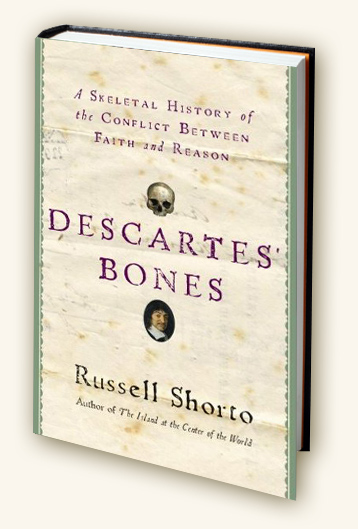
Descartes' Bones by Russell Shorto
NOTE FROM THE AUTHOR
Welcome to the website for my new book, Descartes' Bones. My publisher asked me to write a bit of "story behind the story" text to introduce the book, but authors have their own sense of things, and I decided I would rather use this opportunity to make the following categorical pronouncement:
I do not have a bone fetish.
Even before the book came out, people began sending me what they believed I would find to be irresistible tidbits about Mussolini's jaw or Christ's foreskin or the vertebrae of John Wilkes Booth. The fact that I have devoted a book—not to mention a few years of my life—to human remains does not mean that I feel some special attraction to corpses or body parts (not when the parts are detached from living bodies anyway). My preoccupation with the bones in question stems from something quite other. Allow me to explain.
One day a few years ago, sitting beneath the soaring canopy of the Main Reading Room of the New York Public Library, I experienced a sensation that comes very rarely to a writer, but frequently enough to be recognized and cherished. I was reading an old volume about 17th century philosophy when I came upon a reference to the fact that in 1666, sixteen years after the death of the philosopher René Descartes, people began taking pieces of his remains and treating them like relics. I will admit to feeling a leap in my chest on taking in this information. The odd little detail spoke to me. At the time I didn't know what it was saying, but I had lived long enough to trust my instincts. So I pursued it, tugged at this end of string that happenstance had laid in my path.
That was the beginning of a four-year search that led me to move to Europe and took me to the majestic Bibliotheque Nationale in Paris, to the little cemetery in Stockholm where Descartes was first buried, to the house in the Loire Valley of France where he was born, to a basement storage room in the Musée de l'homme, the great anthropology museum in Paris, where his skull occupies a portion of real estate in the basement.
And why? "Sometimes a cigar is just a cigar," Freud is supposed to have said when challenged to apply his sexual symbolism to his own personal habits. To which I would respond: sometimes a bone is not just a bone. As a medieval Catholic could have told you, as a thing left over after a human life, a bone can become a symbol—a representation of the life lived and the things done, and of their after-effects. And if the life was unusually consequential, a bone can resonate in all sorts of ways. It can become a vehicle for conveying beliefs and hopes and, in narrative terms, a genuine—if highly alternative—way of approaching history.
In the course of my research I discovered that Descartes' bones—his skull, his right index finger, the whole skeletal presence—rankled through western history, and had a Zelig-like sideshow presence in many of history's great events. His bones played a role in the French Revolution, and in the development of the field of anthropology. They were objects of fascination or reverence for some very important people, as well as some unimportant but wonderfully strange people.
Descartes' bones mattered to these people because they were in the process of trying to figure out the world in which they lived—a fast-changing world in which meaning itself was changing. That describes our world, does it not? Uncertainty is a feature of modernity—of the world that Descartes himself helped bring into being. And I suppose that is where the bones of Descartes get personal for me. Researching a work of historical nonfiction is like applying yourself to an exotic branch of psychoanalysis. In writing, even while looking at things that are very much other, you are always trying to find yourself. In this sort of writing, you are doing that while following what you suspect is a slippery subterranean truth about history and the culture in which you live.
Now, five years after I began to mess about with Descartes' bones, I see that I was doing so because they were for me a talisman and a guide to our times: a link between our physical beings and our seemingly unlimited, unbounded minds. I would be a fool to promise that reading Descartes' Bones will solve the age-old problems of modernity for you: the philosophical mind-body problem, or the tension between faith and reason that many of us feel. But I think the book shows that these issues, which are at the root of some of the biggest conundrums the world faces today, have been with us since the time Descartes and his contemporaries lived and breathed. So maybe in a small way the book can help situate us in our past, and remind us, however passingly, of who we are.
I hope what I've written here has stirred you to read more. If so, please write and give me your own views: on the mind-body problem, atheism, religion-fueled terrorism, what have you. But if you have a thought to include reference to Napoleon's penis, I can only ask you to hold it. The thought, that is.